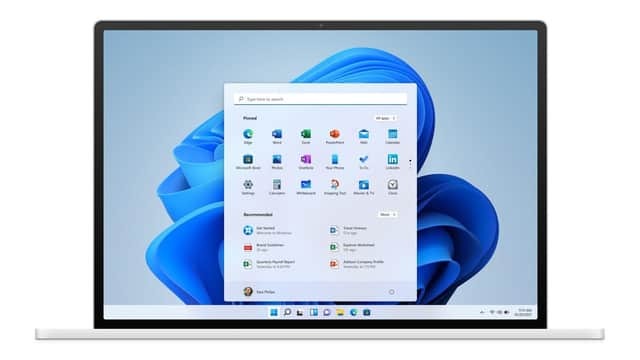Will your PC run Windows 11, and do you even want it?


Windows 95 came bundled with a service known as the Microsoft Network, which was supplanted almost immediately by the world wide web. But it placed a start button in the bottom-left corner of our screens and there it has stayed ever since.
A generation later, with Windows now almost as old as Mick Jagger, a new version is about as newsworthy as finding a shell on Scarborough beach. Did you even notice the latest one last month?
Advertisement
Hide AdAdvertisement
Hide AdWindows 11 is another makeover for a system which is arguably 20 years past its sell-by date. It has a new look and feel – the start button has moved to the bottom centre – but few new features, but that’s fine because this time Microsoft is not asking you to buy it. In fact, in many cases it’s not even going to let you use it.
The first test version of the new system has just been released, in advance of a wider rollout by the end of the year. It will be offered as a free upgrade to existing computers running Windows 10, so long as they meet Microsoft’s minimum specification. The headline requirement is a two-core processor or better with at least four gigabytes of memory, which accounts for all but the most basic laptops.
But the small print tells another story. Windows 11 will only officially support Intel Core processors and their equivalents from 2017 and later. Older chips are likely to be incompatible, and that includes many still in use on current machines – Microsoft’s own £3,500 Surface Studio 2 among them.
The reason for this is the absence from older processors of something called Trusted Platform Module or TPM, and it introduces a whole new consideration when buying a PC. TPM is an international standard for securing computers against hackers by using hardware rather than software. Windows has always been vulnerable to attacks by intruders, so this new form of double glazing comes not a moment too soon. But the requirement does have the effect of rendering a great many machines effectively redundant.
Advertisement
Hide AdAdvertisement
Hide AdWindows 11 requires TPM version 2.0 to be built into your hardware, and the list of processors that have it is very short. Microsoft’s assertion that “most Windows 10 PCs currently being sold will be able to upgrade to Windows 11” isn’t entirely helpful. It acknowledges that many will not.
That doesn’t mean you should upgrade your computer, but it does mean that if you’re planning to buy a new one anyway, you should look for one that is guaranteed to be compatible with the new system.
This is especially true of any machine you’re going to be using for working from home. Apart from the improved security, Windows 11 promises to let you install some of your Android phone apps on your PC, to streamline the process of getting information from one device to another. It’s unclear yet how this will work, as the feature is absent from the first test build.
Windows 10, meanwhile, will continue to work on computers that can’t be upgraded, though a time will come when Microsoft stops updating it. Whether that will be in two years or more, it won’t yet say – but given its track record for “retiring” systems it considers obsolete, it’s very unlikely to outlast the Rolling Stones.
Advertisement
Hide AdAdvertisement
Hide AdSupport The Yorkshire Post and become a subscriber today. Your subscription will help us to continue to bring quality news to the people of Yorkshire. In return, you’ll see fewer ads on site, get free access to our app and receive exclusive members-only offers. Click here to subscribe.
Comment Guidelines
National World encourages reader discussion on our stories. User feedback, insights and back-and-forth exchanges add a rich layer of context to reporting. Please review our Community Guidelines before commenting.